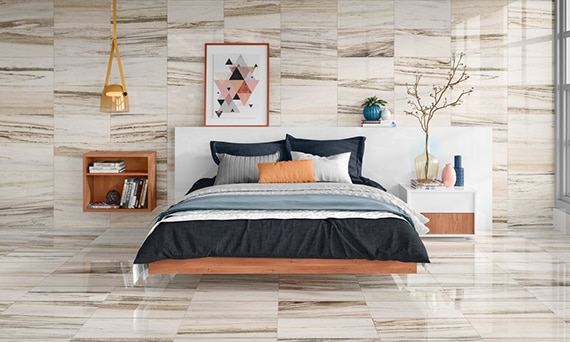
Industry Standards
Product Usage
Floor Tile
Wall Tile
Countertop
Shower Floor
Exterior Floor
*See performance features for installation-specific details.
**See floor and wall usage criteria and abrasion resistance, DCOF, and frost resistance criteria for installation-specific details.
Product Features
Certified Porcelain
Customize
Encaustic
Large Format
Made in the USA
Mosaic/
DEco
Product has mosaic or deco tile available.
Paver
Tile can be used outdoors as a paver.
Post-Consumer Recycled
Pre-Consumer Recycled
Reveal Imaging
Tile employs imaging technology and inkjet printing.
STEPWISE™
Tile has infused technology that makes it 50% more slip-resistant.
Terrazzo
Tile has infused technology that makes it 50% more slip-resistant.
TRUEDGE™
Zerotox
Product Materials
Ceramic
Glazed Ceramic
Porcelain
Colorbody Porcelain
Glazed Porcelain
Glass
Metal
Mixed Materials
Quartz
Natural Stone
Granite
Limestone
Marble
Quartzite
Slate
Soapstone
Travertine
Installation
Performance Characteristics
| Grout Joint Recommendation | This represents the minimum width the grout joint should be to avoid lippage, breakage, etc. There may also be a recommendation for placement of tile in brickjoint layout and different requirements for floor and wall installations. |
| Shade Variation | Tile coloring can range from monochromatic to a highly varied in coloring and shading. Variation exists within individual tiles and from tile to tile. Results range from V0 to V4 where V0 is uniform and monochromatic and V4 has considerable variation from tile to tile. |
| Water Absorption | A measurement of density and porosity that determines how much water tile will take on when exposed to water. Based on ASTM testing standards. Results given in percentage of water absorbed by the tile. |
| Breaking Strength | A measurement of pounds required to cause a tile to break. Based on ASTM testing standards. Results given in pounds at which the tile broke in testing. |
| Scratch Hardness | A measurement of the resistance of a tile when scratched by ten reference materials (gypsum, fluorite, quartz, diamond, etc.). Based on the MOHS hardness scale. Results given on a 1-10 scale where 1 is low scratch resistance and 10 is high scratch resistance. |
| Chemical Resistance | A measurement of resistance to chemical substances when exposed over time. Based on ASTM testing standards. Results given as resistant or not resistant. |
| Abrasion Resistance | A measurement of resistance to visible surface abrasions and wear. Based on ASTM testing standards. Results given on a 1-5 scale where 1 is best suited for light traffic and 5 is suited for heavy commercial traffic. |
| DCOF | Dynamic coefficient of friction, DCOF, measures friction between two surfaces especially where there is contamination. Results reflect the amount of force required to keep two surfaces sliding against one another. StepWise technology increases friction and makes tile 50% more slip resistant than regular tile. |
What is DCOF?
DCOF, or dynamic coefficient of friction, is the primary product performance measure used by the North American tile industry to identify suitable applications for a floor product. When it comes to choosing the right tile for an area, DCOF is a main consideration, especially when selecting tiles for areas that may be subjected to water, oil, or grease exposure.
ANSI A137.1 requires tile flooring products to have a DCOF of 0.42 or greater if recommended for use in a level interior space intended to be walked upon when wet. This specification is based on wet DCOF measurement performed according to ANSI A326.3.
ANSI A326.3 Wet DCOF measurements are based on specific standard practices under controlled conditions. These measurements provide useful information for comparison of product performance, but measurements should not be considered as an indicator of whether a slip can occur.
Friction is the innate force that resists the sliding motion of one surface against another. The DCOF of a surface is a measurement of the force necessary to keep a surface already in motion sliding over another surface and it is likened to the frictional forces a person experiences when walking.
Putting Safety First
American Olean was among the first in 2012 to join the Tile Council of North America in testing our products for DCOF per the test method now defined in ANSI A326.3. This method is the most widely accepted measurement of dynamic coefficient of friction (DCOF) for hard surface flooring, not just on ceramic tile.
In addition to recommendations for appropriate applications, product DCOF specifications are listed on the American Olean website.
The chart below details American Olean’s recommended product application based on measured DCOF values. Due to limitations of the test, measured DCOF value is not an appropriate indicator of performance for all product types. For such products, different criteria are used to determine use classification per the requirements of Section 3.4 of ANSI A326.3-2021.
Regardless of declared product use classification, specifier shall determine materials appropriate for specific project conditions, considering by way of example, but not in limitation, type of use, traffic, expected contaminants, expected maintenance, expected wear, and manufacturers’ guidelines and recommendations.
DCOF Recommended Applications
American Olean recommends that the following guidelines shall be utilized together with a regular cleaning / maintenance program.
Information in italics correspond to relevant ANSI A326.3 Section 4 - “Product Use Categories”
| Product Use Classification | Example Area | DCOF per ANSI A326.3 |
|
Dry & Level Interior
Interior Dry (ID) |
Level public areas that are DRY and contaminant free. Some examples are (but not limited to): hotel lobbies, apartments, public buildings, shopping centers (excluding food areas), hospitals, elevator lobbies, interior hallways, cafeterias, retail stores, theatre lobbies and other dry health service areas. | ≥ 0.42 Dry |
|
Wet & Level Interior
Interior Wet (IW) |
Level public areas that are likely to be walked on when WET. Some examples are (but not limited to): Entry foyers of hotels, offices and other public buildings, supermarkets (entry areas, food preparation, produce, or any area where water may occasionally be present), shopping center food courts, and toilet facilities, and production areas not involving oil or fats. |
≥ 0.42 Wet |
|
Exterior Applications
Exterior Wet (EW) |
Level Pedestrian areas that could be exposed to water (excluding ice), but are otherwise reasonably maintained, where footwear is typically used. Some examples are (but not limited to): walkways, gazebos, or patio areas. | ≥ 0.60 Wet |
|
Pool Decking (and other wet areas with minimal footwear) Interior Wet+ (IW+) |
Level Service or recreation areas involving constant water where light or no footwear is used. Some examples are (but not limited to): public showers, steam rooms, swimming pool decks, and locker rooms. | ≥ 0.60 Wet |
|
Oils
Oils / Greases (O/G) |
Level Service or production areas involving oils, greases, and/or fats. Some examples are (but not limited to): automotive fluids, catering areas, areas involving deep-fry and grill equipment, other food preparation areas involving grease or oil. BOH (Back of the house) quick service or family style restaurants or delicatessens. Any area where combined grease and water accumulation may be present. American Olean recommends Quarry tile and treaded paver products for this application. | ≥ 0.60 Wet |
| Ramps & Inclines | Inclined areas or ADA compliant ramps. Some examples are (but not limited to): Stairs and stair treads/nosings, wheelchair ramps, workshop bays (where no oil is present), sidewalks, and driveways where pedestrian traffic is normally present. | ≥ 0.65 Wet |
Additional considerations relating to product selection
1. Absent exceptions listed on this page indicating otherwise, ceramic and porcelain tiles should not be used in floor applications where there is a consistent surface presence of water, oil, or grease. This includes outdoor areas.
2. Proper maintenance is critical. Improper maintenance and improper maintenance products can result in a build-up on the surface of the tile causing the tile to be slippery. See maintenance recommendations.
3. Test Methods - there are many different test methods related to slip resistance. American Olean recommends that customers have tile independently tested to determine if the American Olean product meets the requirements of the customer's preferred test method. American Olean and the tile industry recognize ANSI A326.3 - American National Standard Test Method for Measuring Dynamic Coefficient of Friction of Hard Surface Flooring Materials. American Olean does not warrant that any of its products will meet any testing parameter other than that measured per ANSI A326.3.
4. ANSI A137.1 requires that tiles suitable for interior level spaces expected to be walked upon when wet have a minimum, wet DCOF of 0.42.
5. No floor tile is "slip proof."
6. Slippery conditions can be reduced by limiting foot traffic in contaminated conditions, use of appropriate footwear, prompt removal of contaminants, effective drainage, and proper maintenance. Installations and end use conditions can vary. The end user must evaluate the tile to be used with their specific end use conditions, maintenance program(s), and footwear selection to determine compatibility.
7. Tile size can be a factor for slip resistance in wet areas. Smaller sizes allow for more drainage through an increased number of grout joints and easier sloping. Planar variations on larger formats could result in a higher probability of standing water and increase the risk for hydroplaning.
8. Polished and semi polished surfaces create a very smooth surface. American Olean does not recommend polished surfaces in any areas that may be subjected to water, oil, or grease exposures.
9. Internal manufacturer selection criteria can for example, but not in limitation, be based on factors such as: DCOF limit values established using the ANSI A326.3 test method, limit values based on other test methods, internal reference standards and practices, presence of abrasive grain, presence of surface structure and/or experience with similar surfaces.





